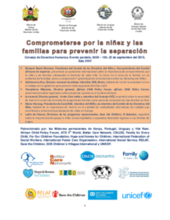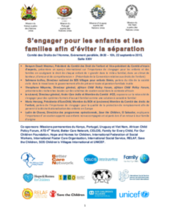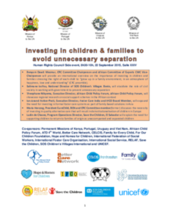Displaying 291 - 300 of 379
This chapter first traces the etymology of the definition of “orphan” and its attendant “crises.” Then, using examples from Guatemala and Uganda, the authors consider how the idea of an “orphan crisis” has traveled from development to charitable responses and what effects this has on local child protection systems.
Même si la crise des enfants migrants non accompagnés d’Amérique centrale qui tentent de rejoindre les Etats-Unis ne fait plus la une des journaux, elle continue. De concert avec les gouvernements, l’UNICEF s’efforce de remédier aux causes de cette migration et de garantir la protection et les droits des enfants qui décident d'entreprendre ce périlleux périple.
Lumos is seeking an experienced programmes, advocacy and policy professional, confident in advocating for children’s rights at the highest level of policy makers in the LAC region and implementing change on the ground.
Lumos requiere un profesional con experiencia en programas, en incidencia y en trabajo relacionado con diseño de políticas confiado en su capacidad de abogar por los derechos del niño ante los responsables de formular políticas al más alto nivel en la región de ALC y de efectuar cambios sobre el terreno.
This article from Human Rights First highlights the harmful impact that the detention of asylum-seeking families in the US has on children.
Este evento paralelo del Consejo de Derechos Humanos incluyó presentaciones en separación familiar en los contextos africanos, asiáticos, europeos, y latinoamericanos.
This Human Rights Council Side event included presentations on family separation in the African, Asian, European, and Latin American contexts.
This Human Rights Council Side event included presentations on family separation in the African, Asian, European, and Latin American contexts.
This article tells the story of several Guatemalan adoptees and their adoptive parents as they reunite with their birth families in Guatemala.
A child trafficking scheme in Mexico has recently been uncovered, according to the article.
Visionaries, a documentary series on public television in the United States, aired two episodes featuring the work of Disability Rights International (DRI) in uncovering the egregious abuses suffered by children and adults with disabilities living in institutions around the world.



